Related Research Articles

The Cannes Film Festival, until 2003 called the International Film Festival, is an annual film festival held in Cannes, France, which previews new films of all genres, including documentaries, from all around the world. Founded in 1946, the invitation-only festival is held annually at the Palais des Festivals et des Congrès. The festival was formally accredited by the FIAPF in 1951.

Sven Erik Alf Sjöberg was a Swedish theatre and film director. He won the Grand Prix du Festival at the Cannes Film Festival twice: in 1946 for Torment, and in 1951 for his film Miss Julie.
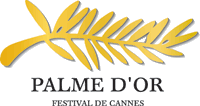
The Palme d'Or is the highest prize awarded at the Cannes Film Festival. It was introduced in 1955 by the festival's organizing committee. Previously, from 1939 to 1954, the festival's highest prize was the Grand Prix du Festival International du Film. In 1964, the Palme d'Or was replaced again by the Grand Prix, before being reintroduced in 1975.

René Clément was a French film director and screenwriter. He is known for directing the films The Battle of the Rails (1946), Forbidden Games (1952), Gervaise (1956), Purple Noon (1960), and Is Paris Burning (1966). He received numerous accolades including five prizes at the Cannes Film Festival and the Honorary César in 1984.
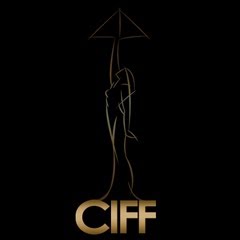
The Cairo International Film Festival is an annual internationally accredited film festival held in Cairo Opera House. It was established in 1976 and has taken place every year since its inception, except for 2011 and 2013, when it was cancelled due to budget limitations and political instability. It is the only international competitive feature film festival recognized by the FIAPF in the Arab world and Africa, as well as the oldest in this category.

Christian-Jaque was a French filmmaker. From 1954 to 1959, he was married to actress Martine Carol, who starred in several of his films, including Lucrèce Borgia (1953), Madame du Barry (1954), and Nana (1955). In 1961 he married Laurence Christol

Nicole Garcia is a French actress, film director and screenwriter. Her film Charlie Says was entered into the 2006 Cannes Film Festival. Her film Going Away was screened in the Special Presentation section at the 2013 Toronto International Film Festival. She was the president of the jury for the Caméra d'Or section of the 2014 Cannes Film Festival.
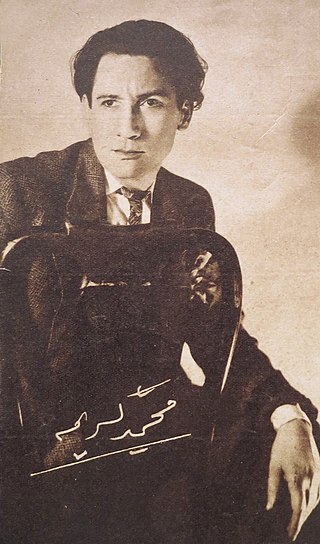
Mohammed Karim (1896–1972) was an Egyptian film director, writer, and producer. Karim brought Faten Hamama to fame in the movie Yawm Said. His 1946 film Dunia was entered into the 1946 Cannes Film Festival.
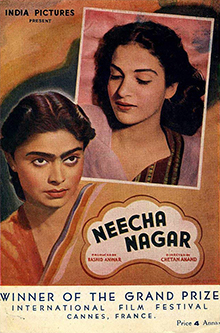
Neecha Nagar is a 1946 Indian Hindi-language film, directed by Chetan Anand, written by Khwaja Ahmad Abbas and Hayatullah Ansari, and produced by Rashid Anwar and A. Halim. It was a pioneering effort in social realism in Indian cinema and paved the way for many such parallel cinema films by other directors, many of them also written by Khwaja Ahmad Abbas. It starred Chetan Anand's wife Uma Anand, with Rafiq Anwar, Kamini Kaushal, Murad, Rafi Peer, Hamid Butt, and Zohra Sehgal. Neecha Nagar was a Hindi film adaptation in an Indian setting of Russian writer Maxim Gorky's 1902 play The Lower Depths.

The Jury Prize is an award of the Cannes Film Festival bestowed by the jury of the festival on one of the competing feature films. According to American film critic Dave Kehr, the award is "intended to recognize an original work that embodies the spirit of inquiry."

The Best Director Award is an award presented annually at the Cannes Film Festival since 1946. It is given for the best achievement in directing and is chosen by the International Jury from the films in the Competition slate at the festival.

The Best Actress Award is an award presented at the Cannes Film Festival since 1946. It is given to an actress who has delivered an outstanding performance and chosen by the jury from the films in official competition slate at the festival.

The Best Actor Award is an award presented at the Cannes Film Festival since 1946. It is given to an actor who has delivered an outstanding performance and chosen by the jury from the films in official competition slate at the festival.

Samir Farid was an Egyptian writer and a world renowned film critic, journalist and film historian based in Cairo. He authored and/or translated over 60 books since 1966 on Egyptian, Arab and World cinema. He was the consultant for Cinema affairs in the Bibliotheca Alexandrina. (2001-2016).
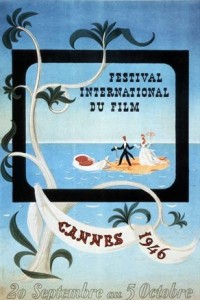
The 1st annual Cannes Film Festival was held from 20 September to 5 October 1946. Twenty-one countries presented their films at the "First Cannes International Film Festival", which took place at the former Casino of Cannes. Only one year after the end of World War II, most of the films were about the war. There arose several technical issues, such as the tarpauline cover blowing away in a storm on the day before the winners were to be announced, the reels of Alfred Hitchcock’s Notorious shown in reverse order, and Miguel M. Delgado’s The Three Musketeers projected upside-down.
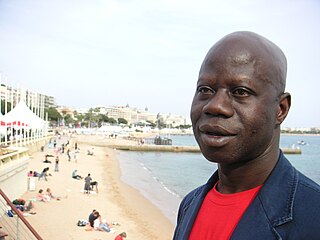
Saint Pierre Yameogo was a Burkinabé film director and screenwriter. He directed six films since 1987. His film Delwende was screened in the Un Certain Regard section at the 2005 Cannes Film Festival where it won the Prize of Hope award.
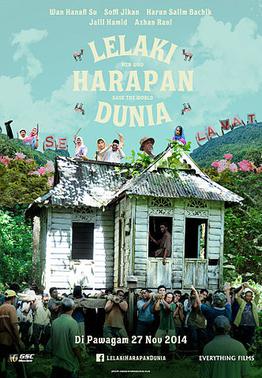
Men Who Save the World is a 2014 Malaysian Malay-language comedy film written and directed by Liew Seng Tat. The film was nominated for multiple awards in international film festivals, and won several awards at the 27th Malaysian Film Festival, including Best Picture.
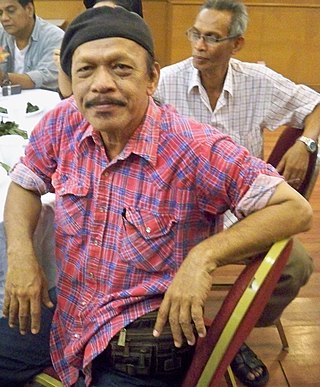
Khalid bin Salleh was a Malaysian actor and poet.
References
- ↑ "Festival de Cannes: Dunia". festival-cannes.com. Archived from the original on 12 February 2012. Retrieved 3 January 2009.